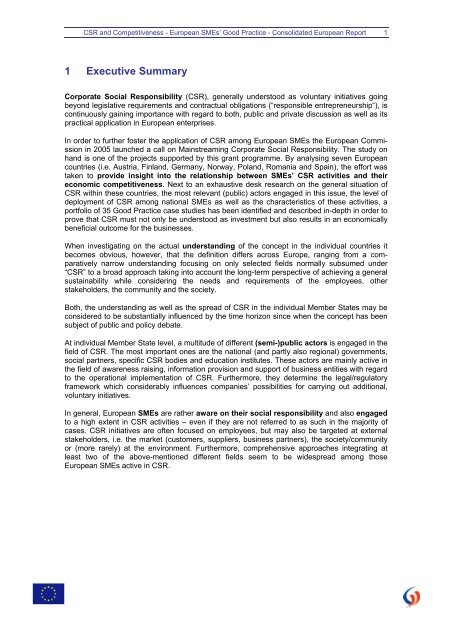CSR and Competitiveness European SMEs - KMU Forschung Austria
CSR and Competitiveness European SMEs - KMU Forschung Austria
CSR and Competitiveness European SMEs - KMU Forschung Austria
Create successful ePaper yourself
Turn your PDF publications into a flip-book with our unique Google optimized e-Paper software.
<strong>CSR</strong> <strong>and</strong> <strong>Competitiveness</strong> - <strong>European</strong> <strong>SMEs</strong>’ Good Practice - Consolidated <strong>European</strong> Report 1<br />
1 Executive Summary<br />
Corporate Social Responsibility (<strong>CSR</strong>), generally understood as voluntary initiatives going<br />
beyond legislative requirements <strong>and</strong> contractual obligations (“responsible entrepreneurship“), is<br />
continuously gaining importance with regard to both, public <strong>and</strong> private discussion as well as its<br />
practical application in <strong>European</strong> enterprises.<br />
In order to further foster the application of <strong>CSR</strong> among <strong>European</strong> <strong>SMEs</strong> the <strong>European</strong> Commission<br />
in 2005 launched a call on Mainstreaming Corporate Social Responsibility. The study on<br />
h<strong>and</strong> is one of the projects supported by this grant programme. By analysing seven <strong>European</strong><br />
countries (i.e. <strong>Austria</strong>, Finl<strong>and</strong>, Germany, Norway, Pol<strong>and</strong>, Romania <strong>and</strong> Spain), the effort was<br />
taken to provide insight into the relationship between <strong>SMEs</strong>’ <strong>CSR</strong> activities <strong>and</strong> their<br />
economic competitiveness. Next to an exhaustive desk research on the general situation of<br />
<strong>CSR</strong> within these countries, the most relevant (public) actors engaged in this issue, the level of<br />
deployment of <strong>CSR</strong> among national <strong>SMEs</strong> as well as the characteristics of these activities, a<br />
portfolio of 35 Good Practice case studies has been identified <strong>and</strong> described in-depth in order to<br />
prove that <strong>CSR</strong> must not only be understood as investment but also results in an economically<br />
beneficial outcome for the businesses.<br />
When investigating on the actual underst<strong>and</strong>ing of the concept in the individual countries it<br />
becomes obvious, however, that the definition differs across Europe, ranging from a comparatively<br />
narrow underst<strong>and</strong>ing focusing on only selected fields normally subsumed under<br />
“<strong>CSR</strong>” to a broad approach taking into account the long-term perspective of achieving a general<br />
sustainability while considering the needs <strong>and</strong> requirements of the employees, other<br />
stakeholders, the community <strong>and</strong> the society.<br />
Both, the underst<strong>and</strong>ing as well as the spread of <strong>CSR</strong> in the individual Member States may be<br />
considered to be substantially influenced by the time horizon since when the concept has been<br />
subject of public <strong>and</strong> policy debate.<br />
At individual Member State level, a multitude of different (semi-)public actors is engaged in the<br />
field of <strong>CSR</strong>. The most important ones are the national (<strong>and</strong> partly also regional) governments,<br />
social partners, specific <strong>CSR</strong> bodies <strong>and</strong> education institutes. These actors are mainly active in<br />
the field of awareness raising, information provision <strong>and</strong> support of business entities with regard<br />
to the operational implementation of <strong>CSR</strong>. Furthermore, they determine the legal/regulatory<br />
framework which considerably influences companies’ possibilities for carrying out additional,<br />
voluntary initiatives.<br />
In general, <strong>European</strong> <strong>SMEs</strong> are rather aware on their social responsibility <strong>and</strong> also engaged<br />
to a high extent in <strong>CSR</strong> activities – even if they are not referred to as such in the majority of<br />
cases. <strong>CSR</strong> initiatives are often focused on employees, but may also be targeted at external<br />
stakeholders, i.e. the market (customers, suppliers, business partners), the society/community<br />
or (more rarely) at the environment. Furthermore, comprehensive approaches integrating at<br />
least two of the above-mentioned different fields seem to be widespread among those<br />
<strong>European</strong> <strong>SMEs</strong> active in <strong>CSR</strong>.




